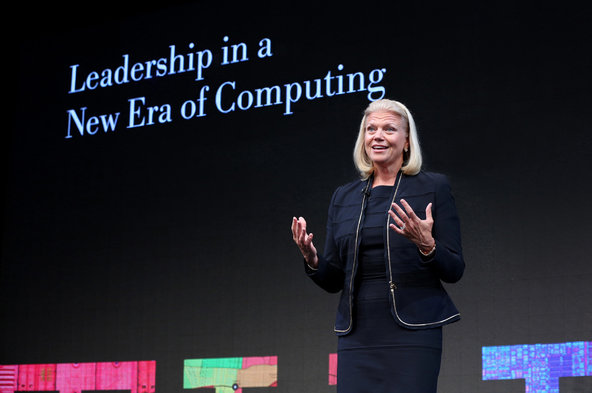 Feature Photo Service for IBMThe acquisition of SoftLayer is the largest deal I.B.M. has made under the leadership of Virginia M. Rometty, who became chief executive in January 2012.
Feature Photo Service for IBMThe acquisition of SoftLayer is the largest deal I.B.M. has made under the leadership of Virginia M. Rometty, who became chief executive in January 2012.
9:51 a.m. | Updated
I.B.M. announced on Tuesday that it had agreed to buy SoftLayer Technologies, a cloud computing company, in an effort to strengthen I.B.M.’s position in the fast-growing market for computing sold to businesses as a service delivered over the Internet.
The purchase price was not disclosed. But it was about $2 billion, according to a person told of the negotiations, who has asked not to be named because he had not been authorized to speak publicly about the terms.
SoftLayer, a private company based in Dallas, has a network of 13 data centers in the United States, Singapore and Amsterdam, and revenue of about $400 million a year. GI Partners, a private equity fund based in Menlo Park, Calif., is the majority owner of SoftLayer.
The acquisition is the largest made under the leadership of Virginia M. Rometty, who became chief executive in January 2012. The move, analysts say, also gives I.B.M. a broader presence in the business of cloud computing services.
I.B.M.’s first moves in the cloud market date back to 2007. But its early emphasis, analysts say, had mainly been on so-called private clouds, in which the computing is delivered to users as service over the Internet but from data centers owned by I.B.M.’s corporate customers.
But the SoftLayer acquisition will sharply expand I.B.M.’s capability to deliver computing services remotely to customers from I.B.M. data centers – the so-called public cloud model.
The SoftLayer data centers will be added to the 10 cloud services data centers I.B.M. now has worldwide. Erich Clement, a senior vice president of I.B.M. technology services unit, said SoftLayer “completes our portfolio.” It expands I.B.M.’s public cloud operations, he said, while adding expertise and technology for private clouds and hybrid services, which blend the public and private models.
Lance Crosby, chief executive of SoftLayer, said his company’s long-term goal has been to become “the de facto and most flexible platform for Internet cloud computing. And we couldn’t get there on our own.” I.B.M., he said, has the financial resources and relationships with corporate customers to accelerate the adoption of its cloud technology.
Amazon is the leader in the public cloud arena, and its roster of customers includes not just start-ups and research projects, but also large companies like Netflix.
Amazon does not break out the revenue for its cloud business, Amazon Web Services, but it is growing fast. The unit had estimated revenue of $2 billion last year, according a recent research report from Barclays, which forecast that Amazon’s cloud business would reach $5 billion or more by 2014.
I.B.M. executives say its strategy is to compete in the public cloud market not with basic computing capabilities like processing and storage, but with software for marketing, procurement and customer service delivered as cloud offerings. Since 2007, the company has spent $4.5 billion on more than a dozen acquisitions to build up its cloud software and services offerings.
“We’re focusing on business services that leverage the cloud model,” said Ric Telford, vice president of I.B.M. cloud services.
Beyond the acquisitions, I.B.M. hopes to offer the company’s homegrown technology as cloud services, like its Watson artificial-intelligence software, which I.B.M. announced last month was being tailored as a smart customer-service assistant.
“Watson has a lot more potential because of the cloud delivery model,” Mr. Telford said.
Dannon, the yogurt maker, is a cloud services customer that reflects the I.B.M. strategy. It uses I.B.M. public-cloud software for optimizing its pricing, promotions and product planning. The cloud software has helped Dannon’s sales planning teams improve the percentage of products sold to consumers from 75 percent to 98 percent – crucial for a food stuff with a limited shelf life. The software was developed by DemandTec, which I.B.M. acquired last year.
In new projects, Dannon, owned by the French company Danone, is now pursuing a “cloud first strategy,” said Timothy Weaver, the chief information officer.
I.B.M. has earmarked its cloud business as an area for investment and growth. That business grew 70 percent in the first quarter of 2013 from the quarter a year earlier. By 2015, I.B.M. has forecast its cloud business should reach $7 billion, including private and public cloud services.
All the major technology companies – including Microsoft, EMC, Hewlett-Packard and Oracle – are pursuing cloud strategies. But analysts say I.B.M., perhaps more than any other company, can assure corporate customers to feel comfortable putting their business information in remote data centers and buying public cloud services.
More than a decade ago, I.B.M. demonstrated that endorsement effect, when it made a big commitment to Linux, the open-source operating system, helping it become a mainstream technology in corporate data centers.
“I.B.M. is very much a trusted brand here,” said Steven Milunovich, an analyst at UBS Securities. “Once they show up, they tend to have a big impact.”
Article source: http://dealbook.nytimes.com/2013/06/04/i-b-m-buys-cloud-computing-firm-in-deal-said-to-be-worth-2-billion/?partner=rss&emc=rss